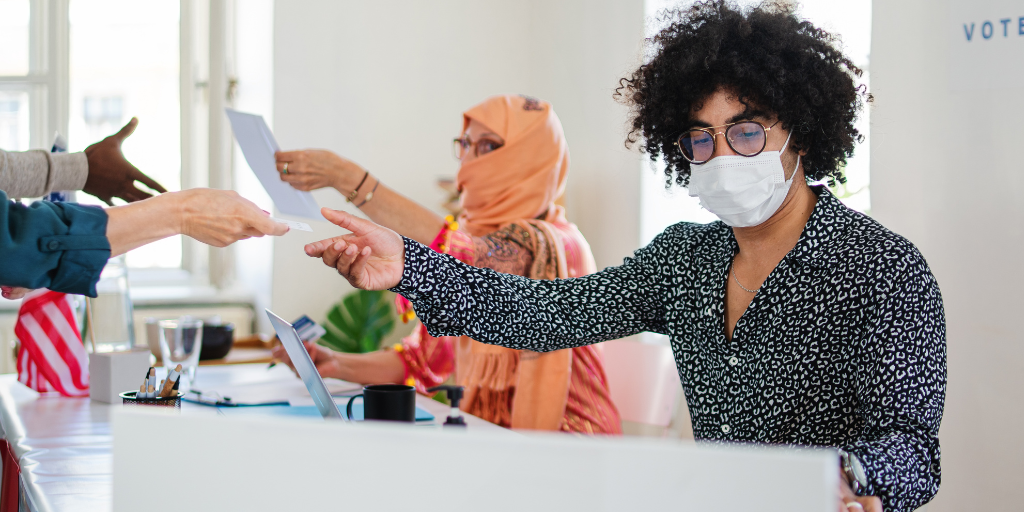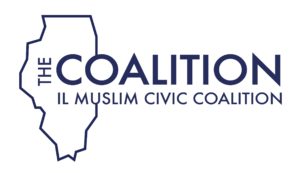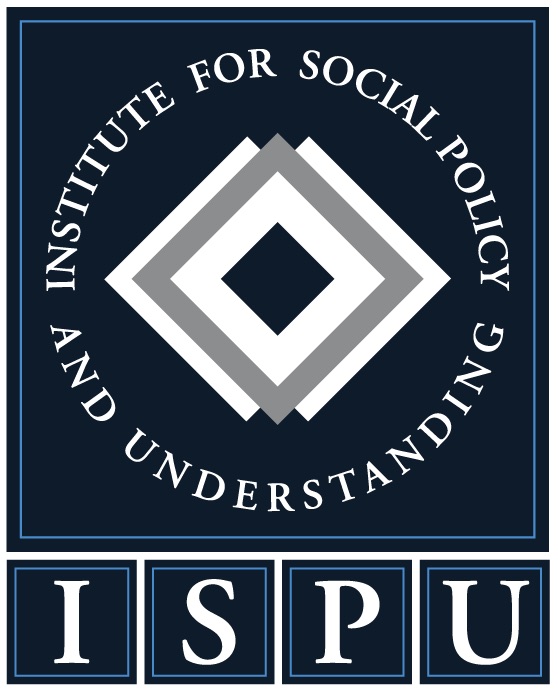.
Illinois Muslims
Needs, Assets, and Opportunities
JULY 28, 2022 | BY DALIA MOGAHED, DR. JOSEPH HOERETH, OJUS KHANOLKAR, AND UMAIR TARBHAI

SUMMARY
Who are Illinois Muslims, and what are their assets and needs? What opportunities exist for leaders, officials, volunteers, policymakers, corporations, media members, and social/civic/philanthropic organizations on how best to understand and support the Muslim community in Illinois? This report presents an empirical assessment of the strengths and struggles of the Illinois Muslim community, with a comparison to the Illinois general public.
.
Executive Summary
This report presents an empirical assessment of the strengths and struggles of the Illinois Muslim community based on nearly 1,800 completed surveys collected from October 15, 2021 to January 31, 2022, with a comparison to the Illinois general public, and four focus groups with Illinois Muslims held between March 22 and March 25. The focus groups consisted of two with Muslim respondents of any age, race or ethnicity, one with African American Muslims only, and one with young adults aged 18-29. The topics examined, in both the survey and focus groups, were curated with community stakeholder input to reflect the priorities of those impacted.
This report is the product of three years of tireless effort by Illinois leaders and researchers to define, fund, and execute this historic study. This research was convened by the IL Muslim Civic Coalition and partners and conducted by the Institute for Policy and Civic Engagement at the University of Illinois Chicago (IPCE) and the Institute for Social Policy and Understanding (ISPU). The results of this research can help guide leaders, officials, volunteers, policymakers, corporations, and social/civic organizations on how best to understand and support Muslim communities in Illinois. This report has deep implications across the nation.
Methodology
This survey used an outreach method referred to as “snowball” sampling, whereby online surveys were distributed through Illinois Muslim community mailing lists associated with mosques, businesses, student associations, individual influencers, cultural centers, and civic organizations. The survey was offered in English, Arabic, Urdu, Bosnian, Farsi, Turkish, Spanish, and French to ensure access to as many respondents as possible. The conveners and researchers also accessed nearly 100 diverse community activists and influencers to provide guidance at different stages throughout the process and to help reach a representative pool of survey respondents. All were asked to share the survey with their own networks, thus the name “snowball” sampling. Conveners and researchers reached out to a diverse group of ethnic and racial communities representing different schools of thought within the Islamic tradition across the state and received surveys from more than 20 counties representing rural and urban communities.
The ideal mix of respondents in any survey would closely resemble the actual population of that target group as a whole in the demographic areas important to the study. For this survey of Illinois Muslims, key demographics included race, age, socioeconomic status, and gender, among other factors.
Addressing Sample Limitations
This methodology is helpful for generating a large sample size but can be difficult to achieve representation despite every effort since respondents are self-selected and not randomly identified by researchers. To account for this anticipated challenge, the research team monitored the demographic mix of the sample as surveys came in and targeted outreach to African American and African immigrant Muslim communities through trusted leaders and influencers. The fielding period was also extended two full months in an effort to maximize representativeness. At the close of the survey, not unlike the national census, the results underrepresented African Americans, low-income Muslims, and refugees. This was then addressed by dedicating a specific focus group to the perspectives of African American Muslims and through the statistical process of “weighting” the data to smooth out some unevenness in representation. Despite these steps, it is recognized that future surveys and research will need to make additional steps to ensure that true representativeness is achieved. [1]
DOWNLOADS
TABLE OF CONTENTS:
Page 1: Executive Summary, Report Overview
Page 2: Introduction, Results: Demographics
Page 3: Results: Individual
Page 4: Results: Family, Results: Community
Page 5: Results: Broader Society, Recommendations and Opportunities

SUMMARY
Who are Illinois Muslims, and what are their assets and needs? What opportunities exist for leaders, officials, volunteers, policymakers, corporations, and social/civic organizations on how best to understand and support the Muslim community in Illinois? This report presents an empirical assessment of the strengths and struggles of the Illinois Muslim community, with a comparison to the Illinois general public.
DOWNLOADS
TABLE OF CONTENTS:
Page 1: Executive Summary, Report Overview
Page 2: Introduction, Results: Demographics
Page 3: Results: Individual
Page 4: Results: Family, Results: Community
Page 5: Results: Broader Society, Recommendations and Opportunities
Executive Summary
This report presents an empirical assessment of the strengths and struggles of the Illinois Muslim community based on nearly 1,800 completed surveys collected from October 15, 2021 to January 31, 2022, with a comparison to the Illinois general public, and four focus groups with Illinois Muslims held between March 22 and March 25. The focus groups consisted of two with Muslim respondents of any age, race or ethnicity, one with African American Muslims only, and one with young adults aged 18-29. The topics examined, in both the survey and focus groups, were curated with community stakeholder input to reflect the priorities of those impacted.
This report is the product of three years of tireless effort by Illinois leaders to define, fund, and execute this historical study. The results of this research can help guide leaders, officials, volunteers, policymakers, corporations, and social/civic organizations on how best to understand and support the Muslim community in Illinois.
Methodology
This survey used an outreach method referred to as “snowball” sampling, whereby online surveys were distributed through Illinois Muslim community mailing lists associated with mosques, businesses, student associations, individual influencers, cultural centers, and civic organizations. The survey was offered in English, Arabic, Urdu, Bosnian, Farsi, Turkish, Spanish, and French to ensure access to as many respondents as possible. The conveners and researchers also accessed nearly 100 diverse community activists and influencers to provide guidance at different stages throughout the process and to help reach a representative pool of survey respondents. All were asked to share the survey with their own networks, thus the name “snowball” sampling. Conveners and researchers reached out to a diverse group of ethnic and racial communities representing different schools of thought within the Islamic tradition across the state and received surveys from more than 20 counties representing rural and urban communities.
The ideal mix of respondents in any survey would closely resemble the actual population of that target group as a whole in the demographic areas important to the study. For this survey of Illinois Muslims, key demographics included race, age, socioeconomic status, and gender, among other factors.
Addressing Sample Limitations
This methodology is helpful for generating a large sample size but can be difficult to achieve representation despite every effort since respondents are self-selected and not randomly identified by researchers. To account for this anticipated challenge, the research team monitored the demographic mix of the sample as surveys came in and targeted outreach to African American and African immigrant Muslim communities through trusted leaders and influencers. The fielding period was also extended two full months in an effort to maximize representativeness. At the close of the survey, not unlike the national census, the results underrepresented African Americans, low-income Muslims, and refugees. This was then addressed by dedicating a specific focus group to the perspectives of African American Muslims and through the statistical process of “weighting” the data to smooth out some unevenness in representation. Despite these steps, it is recognized that future surveys and research will need to make additional steps to ensure that true representativeness is achieved.[1]
.

Results
The results are broken down by responses to survey questions pertaining to the individual respondent themselves, their family, their community, and their perspectives on the broader society beyond their community. Most observations are described as either an “asset” of the Illinois Muslim community or a “need.” Following the results are recommendations and opportunities for a range of stakeholders on how to address the needs.
Individual
ASSET:
Strong Faith Identity: The Illinois Muslim community has several assets at the individual level. For one, Illinois Muslims in our sample have a strong faith identity. More than 4 in 5 Illinois Muslim respondents (84%) reported that their faith is very important to them; 72% attended their house of prayer once a month or more prior to the pandemic [2]. Previous research has linked a strong faith identity with a strong national identity.
Strong Educational Attainment and Expertise: Illinois Muslims are a rich pool of knowledge and expertise. In terms of education, 40% of respondents in the Muslim sample have a college degree or higher, compared with 28% of the Illinois general public sample. Professionally, Muslim respondents were a diverse talent pool, especially in the fields of healthcare, STEM, business, and education.
NEED:
More Halal Options: Muslims in our sample stated they need more access to halal choices, particularly when it comes to food, but halal living includes many other products and services pertaining to all aspects of life (Halal means “permissible” in Arabic and is most often used when referring to food or consumable goods). In particular, 94% of the Illinois Muslim sample reported that it is ‘somewhat’ or ‘very’ important that their purchase decision be halal. At the same time, 39% of Muslim respondents with school-age children and 32% of students enrolled in college said they didn’t have access to halal food at their school, pointing to a need for administrators at grade schools and institutions of higher learning to work to address the religious dietary needs of their Muslim students.
Access to Appropriate Healthcare: Findings point to a need for more research on the obstacles Muslims face when accessing health care services. One-quarter of Illinois Muslim respondents who said they needed immediate medical care in the past year reported that they ‘sometimes’ or ‘never’ got immediate care. This finding underscores the need to conduct further research as to why Muslim patients are less likely to get the care they need in a timely fashion.
Affordable, Culturally Appropriate Mental Health Services: When it comes to mental health, Muslims within our sample were less likely than the general public to seek out therapy services (13% vs. 24%) despite suffering from mental illness symptoms at the same rate as the general Illinois population (47% and 51%, respectively). Roughly one-third (35%) of respondents in the Illinois Muslim sample who reported mental health symptoms but did not seek treatment cite cost as a barrier to seeking treatment. Moreover, 8% among the Muslim sample reported attempting suicide. Though lower than the 18% of individuals in the Illinois general public sample who said the same, these findings reiterate the significant need for culturally appropriate and affordable mental health services for the Illinois Muslim community.
Family
ASSET:
Muslim Marriage: In terms of family makeup, 63% of the Muslim sample responded that they were married at the time of the survey, while 39% of the Illinois general public sample reported the same. Though simply being married is no guarantee for a thriving and healthy family, marriage is still a foundation for healthy family units which extensive research suggests are linked to better outcomes for children.
Strong Intergenerational Support: Compared to the Illinois general population sample, a greater percentage of the Illinois Muslim sample care for their elderly relatives (29% vs. 21%, respectively), suggesting the elderly in the Muslim community are more likely to have family engagement and companionship, which research suggests contributes to better mental and physical health outcomes.
NEED:
More Support for Divorced Families: Respondents in the Illinois Muslim sample indicated a need to better support divorced families. This can include divorced and separated families as well as those going through divorce. Ninety-one percent agree that their faith community should be more supportive of divorced people. This presents an important opportunity for faith-based organizations, counselors, and houses of faith to advocate for more resources devoted to support programs for divorcees.
Greater Education and Support for Domestic Violence Survivors: The Illinois Muslim sample was as likely as the Illinois general public sample to know someone in their faith community who was a victim of domestic violence (17% vs. 14%, respectively). However, compared to the Illinois general public sample, respondents in the Illinois Muslim sample were less likely to report cases of domestic violence to law enforcement (35% vs. 58%, respectively) or a community leader (31% vs. 53%, respectively), underscoring the need to adequately and appropriately serve victims with regard to both law enforcement and victim services.
Sandwich Generation Is Common: Many Muslims in Illinois are taxed with caring for parents and children at the same time in ways that make demands on their time as well as their finances. Nearly all respondents in the Illinois Muslim sample who indicated that they care for elders reported providing hands-on work (91%), while fewer indicated that they help their parents financially (9%). Further research is recommended to understand the impact of this added mental and emotional labor on Muslim mental health.
Improved Access and Awareness of Job Placement Opportunities and Social Services: Findings indicate that the Illinois Muslim sample needs more support for finding jobs and accessing social services to help with financial assistance and food insecurity. Almost one-third, 30%, of the Illinois Muslim sample and the Illinois general public sample reported that they have struggled with job loss. About 20% of both samples have had a household member laid off in the past year. Further, 28% of our Muslim respondents stated they have accessed social welfare programs like SNAP/TANFF, compared with 35% of Illinois general public respondents. Fourteen percent of the Illinois Muslim sample reported not having enough food in the house at some point over the past year. Economically disadvantaged communities are often harder to reach with online surveys that rely on snowball sampling, so the need, in fact, may be even greater than indicated here.
Community
ASSET:
Young and Diverse: As the youngest and most diverse faith community in the state and country, Illinois Muslims are a rich source of capable labor, innovative ideas, and professional expertise.
Illinois Muslims Give Generously: Muslims in our sample are generous with their wealth. Eighty-three percent donated to organizations or causes associated with their faith community in the past year, compared with 46% of the Illinois general public sample. While roughly a third of both the Muslim sample and the Illinois general public sample contributed between $100 and $500 annually, the Muslim sample was more likely to give at the higher end of the spectrum. Roughly a quarter of the Muslim sample contributed between $1,000 and $5,000 annually compared to 16% of the Illinois general public sample.
Frequent Mosque Attendance Is an Asset for Community Mobilization and Mental Health: Roughly 70% of the Muslim sample attended their mosque at least once a month prior to the pandemic. Higher mosque attendance is linked with increased volunteerism and higher civic engagement for the group [3]. In addition, more frequent mosque attendance is linked to better mental health outcomes, such as lower sadness and anger [4].
Muslim Community Reports Less Drug Use But Favors More Support For Addiction Care: Muslims in our sample report consuming significantly less alcohol on a weekly basis than the general public (5% vs. 52%, respectively) and know fewer people in their faith community who struggle with addiction (33% vs. 41%, respectively). However, respondents in the Illinois Muslims sample show concern for community members struggling with addiction, and this concern, rather than condemnation, is an asset to build on. A greater proportion of the Illinois Muslim sample (75%) stated their faith community should provide more support to those struggling with addiction, compared with 53% of the Illinois general public sample.
NEED:
Greater Investment in Nontraditional Nonprofits: We found that while 80% of Muslims do donate to nonprofit organizations, just 9% give to civic organizations, while 3% donate to family and youth organizations or research organizations associated with their faith community. This lack of funding to non-Mosque or relief organizations may leave the Illinois Muslim community with less capacity to inform and advocate and points to a need to invest in such organizations.
More Responsive Muslim Sacred Spaces: This research suggests a need for mosque leadership to better engage those who attend their institutions and find ways to better listen and address their needs. Compared to the Illinois general public sample, Muslims in our sample who attended their house of prayer at least once a month are twice as likely to state that their opinion doesn’t count in their house of worship (28% vs. 14%, respectively). This sentiment held across lines of race, with 37% of Black Muslims and 30% of both Arab and Asian Muslims stating their opinion doesn’t count compared with 10% of white Muslims. Men and women were equally likely to say their opinions don’t seem to count (26% and 30%, respectively). Moreover, one-third of Muslim respondents said young people’s opinions are not included in their house of worship.
Gender Discrimination: Muslim women face gender discrimination within and outside of their faith community. Muslims in our sample stated they have experienced equal amounts of gender discrimination both inside (28%) and outside (34%) their faith community. Muslim women in our sample experienced more gender-based discrimination both inside (47%) and outside (49%) the faith community compared to both Muslim men (14% within the community and 23% outside of the community) and women (25% within their faith community and 31% outside their faith community) in the Illinois general public.
Anti-Black Racial Discrimination Inside and Outside Muslim Communities: Black Muslims in our sample report more racial discrimination inside their faith community (51%) compared with other racial/ethnic groups. Roughly half of Black Muslims as well as Arab and Asian Muslims report experiencing racial discrimination from outside their faith community.
Broader Society
ASSET:
Illinois Muslims Create Jobs: Among Muslim respondents in Illinois, 12% of are self-employed or run their own business, creating more than 350,000 jobs—that’s nearly 6% of all jobs in Illinois, while Muslims only make up 2.8% of the population.
Strong Civic and Political Engagement: Muslims in Illinois who responded to our survey report strong civic engagement with room to grow. Three-quarters of the sample (75%) are registered to vote with an additional 16% expressing an intention to register, opening the door for voter registration drives. Muslim respondents in Illinois were slightly more likely than those in the general public to report deeper civic engagement such as volunteering. Twenty-three percent volunteered for a political campaign in the past 12 months, compared to 17% of the general public, and roughly 30% have contacted an elected official compared to roughly a quarter of the general public. We found that the Muslims in our sample typically had the same policy concerns as the general public, including the economy and healthcare. Muslim respondents, however, stood apart from the public in also prioritizing Islamophobia as a top concern.
Politically Independent: As a community with a significant percentage identifying as “Independent,” Muslims in Illinois may be less tied to partisanship and more to principles when making political choices. It also opens opportunities for both parties to win over segments of the community.
NEED:
Mosque and Faith Center Opposition Remains a Challenge: More than one-third of Muslims in our sample (39%) stated they experienced significant resistance by the local community when trying to move, build, or expand their house of worship. This may present an opportunity for greater interfaith cooperation and allyship between neighbors when religious communities are seeking to build or expand their houses of worship and a need to raise awareness about the impact of national political rhetoric on local community opposition to mosques.
Religious Discrimination: Roughly half of all respondents in the Illinois Muslim sample have faced religious discrimination (52%), more likely than 24% of the Illinois general public sample. This has repercussions ranging from public health to employment, to political representation, and should be a focus for government and non-government organizations tasked with ensuring equal rights for all.
Hate Crimes: Muslim respondents were just as likely as the Illinois general public respondents to be a victim of a hate crime (9% vs. 10%, respectively). These results point to the need for greater support for all vulnerable communities against bias-inspired crimes and an opportunity for coalition building.
Bullying: At a national level, half of Muslim families with children in K-12 say their child has been bullied in the past year because of their religious identity, twice as likely as the general public. While we found that Muslim students in our Illinois sample were bullied less than the national rate (29% vs. 51%), any bullying is a problem that should be addressed by educators and advocates.

Recommendations and Opportunities
The survey and focus group results presented in this report describe a vibrant and diverse Muslim community in Illinois—a community that brings tremendous assets to Illinois’ civic, economic, and cultural spheres, yet also has important and urgent needs. Based on the assets and needs identified in this research, we offer the following recommendations for specific stakeholders.
Funders/Philanthropists
-
- Recognize community diversity and service to all marginalized and often invisible residents. Invest equitably in Muslim-led nonprofits based on demographics and needs.
- Invest in social services supporting Muslim communities, especially related to culturally appropriate family safety, elder care, poverty alleviation, accessibility, addiction, and affordable health and mental health care services.
- Invest in ‘non-traditional’ and therefore underfunded Muslim-led nonprofits such as research and civic organizations.
- Focus on racial equity by recognizing the racialized nature of Islamophobia and supporting efforts to combat it among the general public and within schools, hospitals, and other public and private institutions.
- Leverage community generosity and capacity to donate, engaging with Muslim philanthropists to tackle pressing community challenges.
- Invest in civic engagement efforts to support full community participation in our democratic processes and institutions.
Educators
-
- Include implicit bias training related to Islamophobia and religious-based bullying awareness in staff cultural sensitivity training.
- Ensure educators have access to resources and experts within the Muslim community to better understand and serve our diverse students.
- Partner with Muslim-led community organizations to provide halal options for Muslim students. Also note that all students can consume halal food, so switching to halal providers will address the needs of every student.
- Include information on Muslim contributions to the state of Illinois and the nation in curricula based on recently passed laws. Invite Muslim community members to present on career days and to host interns.
- Include information on accessing social services to low-income families in school material to make sure every child has access to nutritious meals and is ready to learn.
- Raise awareness about recently passed laws addressing faith-based equity to ensure no discrimination based on faith. See https://www.ilmuslimciviccoalition.org/ for more information.
Direct Social Service Providers
-
- Increase outreach to Muslim communities regarding job training and employment support.
- Invest in affordable and culturally appropriate mental health support for Muslims.
- Invest in serving Muslims with disabilities, providing addiction prevention and treatment, supporting aging community members and their families, supporting divorcees, and addressing domestic violence and supporting victims.
- Educate disadvantaged members of the Muslim community on how to access government programs to alleviate food insecurity and access employment support.
- Ensure better access and outreach, provide language access, and connect with trusted messengers to center the voices of Muslim-led organizations to lead this work.
Business Community
-
- Raise awareness in the business community about the Illinois Muslim chambers of commerce, Muslim-led businesses, and the Illinois Muslim community as job creators.
- Better understand and cater to the Muslim consumer who has strong disposable income and purchasing power.
- Understand halal as a healthy, ethical way of living.
- Provide more halal products and services to address the unmet needs of Muslim consumers, especially related to availability of halal food options on college campuses, halal financial options, and halal cultural activities.
- For Muslim business leaders, leverage their collective economic and job-creating clout to advocate for those with less privilege with policymakers (see ISPU’s Strategies to Increase Effective Political Engagement Case Study as an example).
Muslim Community Leaders and Members
-
- Invest in and support specialized faith, social, and civic organizations to address specific needs. The Muslim community is large and diverse, and one or few organizations can no longer meet every need. There is no one voice in this diverse community, so intra-community collaboration and coalition-building is critical between races, ethnicities, genders, etc.
- Mosque leadership should seek ways to better hear and address the opinions of all congregants, including women, young people, and Black Muslims (see ISPU’s research on Reimagining Muslims Spaces).
- Address intra-Muslim racism with education on the impacts and history of white supremacist ideas.
- Leverage the Muslim business community as job creators to address Muslim unemployment in Illinois.
- Invest in community-based resources providing affordable and culturally appropriate mental health support.
- Increase awareness of the Muslim Mental Health Directory.
- Invest in and support services and organizations serving people with disabilities, providing addiction prevention and treatment, supporting aging community members and their families, supporting divorcees, and addressing domestic violence and supporting victims.
- Engage in civic engagement efforts through support and partnership to build community participation and influence.
- Support and educate the community about Laws that empower and help change the narrative about the Muslim Community.
Government and Policymakers
-
- Ensure Muslim experts are at the table when policy is being made, not after it’s already developed.
- Increase and sustain outreach to Muslim constituents and communities, in all their diversity, and understand and address needs.
- Engage Muslim business leaders as job creators and an economic engine for the state.
- Engage Muslim healthcare professionals as a brain trust for health policy in Illinois.
- Invest in social services supporting Muslim communities, especially related to culturally appropriate family safety, elder care, poverty alleviation, accessibility, addiction, and affordable health and mental health care services.
- Muslims vote, contribute, and engage in the political landscape. Ensure Muslim representation grows in elected office. This will ensure communities are integrated and even more engaged in civic society.
- Understand bias/discrimination/Islamophobia, where it comes from, how it manifests, and the role of political rhetoric in both inflaming and dampening it.
- Include Muslim communities in racial equity programming and outreach.
Allies, Advocates, and Practitioners
-
- Recognize the presence of and seek education about Muslim communities, their contributions, and the impact of Islamophobia and discrimination. Consider diversity training for board, staff, and others involved to ensure cultural competency.
- Amplify the voices of Muslim advocates and community leaders seeking equity and partner with them for greater impact.
- Organize and speak up against local efforts to disenfranchise Muslim communities, in the form of mosque opposition as one example.
- Partner with Muslim serving organizations and combine forces for greater impact and culturally appropriate services and programs.
- Access expertise in the Muslim community for advisors, boards, and commissions in every sector, not just for faith or religious needs. Muslims are clearly experts in healthcare, business ownership, education, etc.
- Ensure that your own and/or your organization’s programs take into account the unique needs of Muslim communities and their diverse populations.
Future Researchers
-
- Further research that robustly examines the perspectives of Black Muslims.
- Further research that focuses on the needs of economically disadvantaged Muslims in Illinois.
- Greater exploration of the health care needs of Muslim patients, especially why they are less likely than the general public to receive care when they need it.
- Deeper dives into some of the issue areas discussed in this report to understand their contributing and mitigating factors and uncover evidence-based solutions to challenges identified.
- Further research on the mental health impact of the added cognitive and emotional labor of caring for parents and children at the same time.
Notes
[1] The collected sample also skewed toward wealthier respondents. As noted, this was anticipated for the “snowball” method used in this study. This is mitigated by weighting the data, a process that mathematically adjusts the data to account for relative imbalances in the respondent mix to better match with the demographics of the general population in Illinois. The weighting was done by SSRS, a respected independent research and data analytics firm, with data weighted by gender, age, and education (see Appendix C for further detail). Weighting the data by race was not possible due to differences in the way the question about race was asked in the Muslim survey and how it was asked in the census.
[2] While our sample may have overrepresented mosque-going Muslims because it was a self-selected sample, these numbers are not far from those we see among a random representative national sample.of American Muslims in which 67% say their religion is very important to their daily life and 52% attended their house of prayer once a month or more.
[3] https://www.ispu.org/wp-content/uploads/2018/09/AMP-2016-8_Logo.png?x46312
[4] https://news.gallup.com/poll/148931/presentation-muslim-americans-faith-freedom-future.aspx




